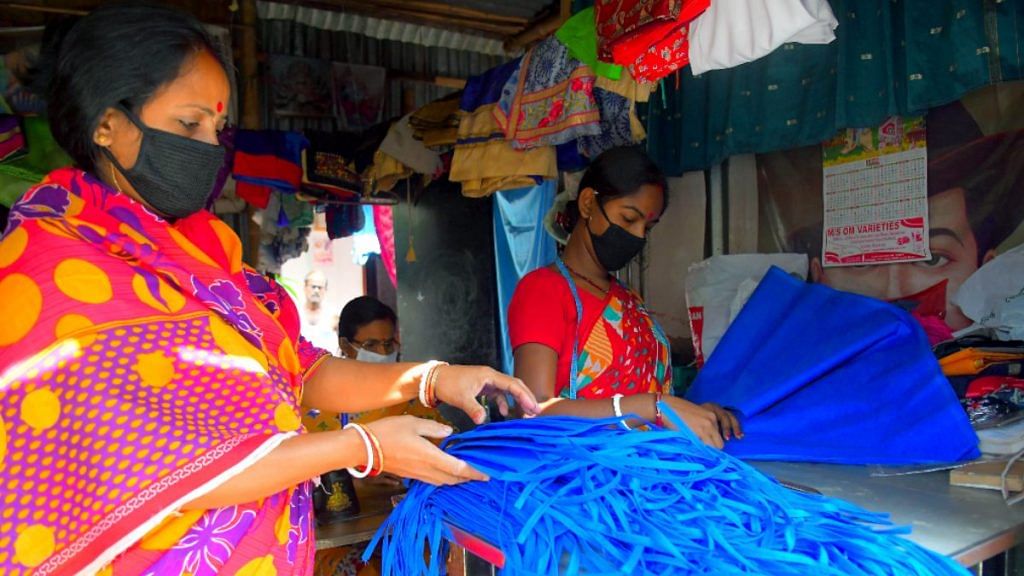Odisha is doing a better job than many other states in successfully handling the Covid-19 crisis because it has deployed some of the key strategies that were previously put in place during cyclones and floods, which ravished the state. Some of these include marshalling the women self-help groups — SHGs — and getting the food and relief distribution models right.
The United Nations (UN) applauded Odisha for its handling of the Phailin by practising, for the first time by any state in India, a ‘zero casualty’ approach and achieving the same. Community participation along with swift and firm administrative actions have been the hallmarks of this achievement.
Also Read: This is how Odisha quarantined me after I returned from Harvard. Other states should learn
Massive reach of SHGs
Odisha CM Naveen Patnaik called upon the state’s gigantic and ever reliable network of two lakh plus women-only self-help groups —comprising about 70 lakh women spread across all the districts, villages and gram panchayats (GPs) of the state — to help. When the first set of health advisories pertaining to symptoms, treatments, and measures to reduce the spread of coronavirus, by maintaining regular hand hygiene and social distancing were announced, it is this network that was able to deliver these advisories by personally reaching out to every household in more than 60,000 villages in about 8,000 gram panchayats within just 3 days.
There was at least one member of each SHG going and explaining everything in person to the members of a household, besides handing out a leaflet. This brought in the kind of seriousness that is required to prevent the spread of the disease. Such a reach had never been experienced before because this massive women force had never been used earlier for administration and governance.
What has surprised everyone is the promptness, efficiency and effectiveness with which this information, education and communication (IEC) activity was carried out. It is precisely for this reason that the pandemic is largely concentrated in the towns of Odisha so far, and has not yet seen community transmission.
Similarly, when CM Naveen Patnaik appealed to everyone to take an oath to stay indoors under the Mo Jiban (My Life) programme, it is these 70 lakh women who led from the front and sent thousands and lakhs of videos showing their solidarity with the CM.
Thus, the community got involved in this preventive measure in a very unique way, not experimented earlier in the Odisha administration.
Also Read: Odisha announces Rs 50 lakh for kin of health & support staff who die treating Covid-19
Odisha’s ‘home police’
When Naveen Patnaik announced that no person shall go hungry during the lockdown, it is again this SHG network that volunteered to set up ration shops in collaboration with the local governments in every gram panchayat and village, and more importantly, even delivered the ration to homes in a few districts in mobile vans. They have also home delivered more than five lakh cooked food packets in 5,247 gram panchayats to the destitute, beggars, homeless and vulnerable who can’t even cook food. It is highly unlikely that any other official or non-official network could have achieved this coverage in such a short time.
Besides, this network has produced as many as 18 lakh masks and distributed them around the state, a large chunk of it for free to the frontline Covid warriors like nurses, safai karmacharis and police personnel. A group of SHGs also contributed to the CM relief fund from their own earnings.
The women SHGs have much more daunting task in store for them. During a recent press conference, Sujata Karthikeyan, secretary of the Mission Shakti department that oversees women SHGs in the state, appealed to them that “About 70 lakh women SHG members, who represent their family, should also do policing in homes just as cops in uniform do.”
Also Read: Gram panchayats, unsung warriors finally emerging as states’ saviour in Covid battle
Women leading the fight
Karthikeyan is not the only woman who is in the team of senior bureaucrats that is dealing with the crisis in Odisha. The implementation of the National Health Mission in Odisha is overseen by a woman; the state level medical corporation, which is responsible for making timely procurement is headed by a woman; and lastly, the department of women and child welfare has a woman as its chief.
The case of Odisha SHG network and its management by woman officers at the helm is a live example of a community working in tandem with the government in spreading awareness, implementing the lockdown and managing its immediate human and societal impacts. This, when highly developed countries like USA, UK, France and Italy, with their most advanced health care systems and much less population density, could not effectively stop the community spread of the disease.
These women SHGs have managed to build a robust community based on resilience and surveillance mechanism in such a short time, which would otherwise have been very difficult to achieve by any other means. The efficacy of this network would again be tested when the migrant labourers return to their villages where the Odisha government has made registration, self- isolation, quarantine and testing mandatory before they can enter their villages. These vigilant troops of women have proven to be the silent warriors in Odisha’s successful tackling of the dreaded pandemic so far.
The author is an MP in the Rajya Sabha from Odisha representing the Biju Janata Dal. He is also the party’s national spokesperson. Views are personal.
